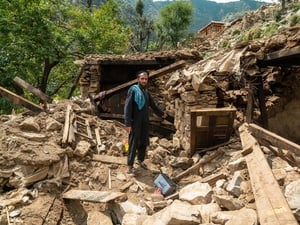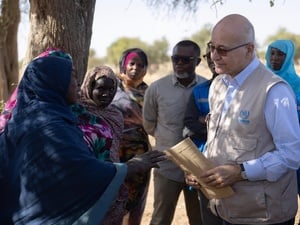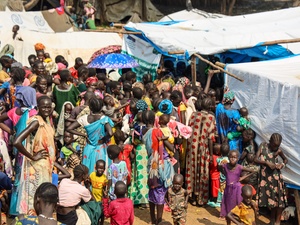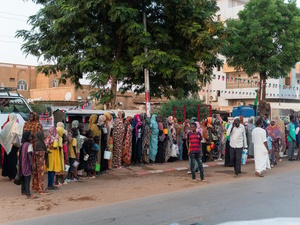Horn of Africa Update
Horn of Africa Update
Eritrea
UNHCR is mounting an assistance programme in Eritrea for some of the hundreds of thousands of people reportedly forced to flee their homes as a result of the current conflict with Ethiopia. Many of the internally displaced are believed to have been returnees assisted previously by UNHCR.
Responding to an Eritrean government request for assistance, UNHCR is deploying staff to coordinate relief efforts inside Eritrea, particularly in areas where former Eritrean refugees in Sudan have returned since the end of the Eritrean war for independence in 1991. UNHCR is preparing to issue an appeal for emergency funding of the operation.
UNHCR had sent relief supplies to Asmara for a planned voluntary repatriation programme for some 160,000 Eritrean refugees who have remained in 12 camps in Sudan for three decades. The repatriation was due to start last month but is now on hold because of the flareup of fighting between Eritrea and Ethiopia. In the meantime, the supplies have been requisitioned by Eritreans and distributed to the displaced.
UNHCR is particularly concerned about reports from various sources that more than 150,000 people uprooted by the current fighting are scattered along the Eritrean border with little food and water. They include some 50,000 people encamped at the Mohammed Ali Hassan Agricultural Scheme - a farm just south of the abandoned town of Tesseney, a few kilometres from the Sudanese border. They are expected to move into Sudan once provisions run out, according to refugees arriving in Sudan.
UNHCR staff in Asmara are awaiting confirmation of the announcement by Ethiopia that its troops will withdraw from Eritrea before they can gain unhindered access to the affected populations.
Sudan
UNHCR has registered around 41,000 Eritrean asylum seekers who have arrived in Sudan's eastern state of Kassala over the past three weeks. The influx continues but at a slower rate over the past two days.
Most of the recent arrivals come from the Mohammed Ali Hassan farm and were able to pay the equivalent of $100 to $300 to rent trucks to transport them to Sudan. UNHCR is concerned about the plight of many of the 50,000 displaced people reportedly gathered at the farm who cannot afford to pay passage into Sudan. Refugees there say they are running out of provisions.
In Sudan, UNHCR has so far registered 22,000 refugees at Lafa, 11,000 at Gulsa, 3,600 at Gerhef, 2,600 at Shagarab, and another 1,000 in two other small encampments at Deman and Um Safir.
UNHCR is airlifting urgently needed relief supplies to Sudan. An Airbus 300 was scheduled to arrive in Khartoum Thursday afternoon, bringing in 42 tons of plastic sheeting, kitchen sets and medical kits from Copenhagen and Cairo.
UNHCR has so far delivered more than 2,400 tents to the Sudanese Commission on Refugees (COR) for distribution to the new arrivals in the extremely hot and arid region, in addition to blankets, kitchen sets, soap and high protein biscuits. The government commission is UNHCR's main implementing partner in Sudan. A few international and local NGOs are collaborating with UNHCR in the humanitarian effort.
Yemen and Djibouti
Around 450 asylum seekers, mostly Eritreans, have arrived by boat in Yemen and 250 others came overland to Djibouti. UNHCR is preparing for more arrivals in these two countries, mainly from Eritrea's Asab region. Among the arrivals were several groups of Ethiopians and Sudanese.









